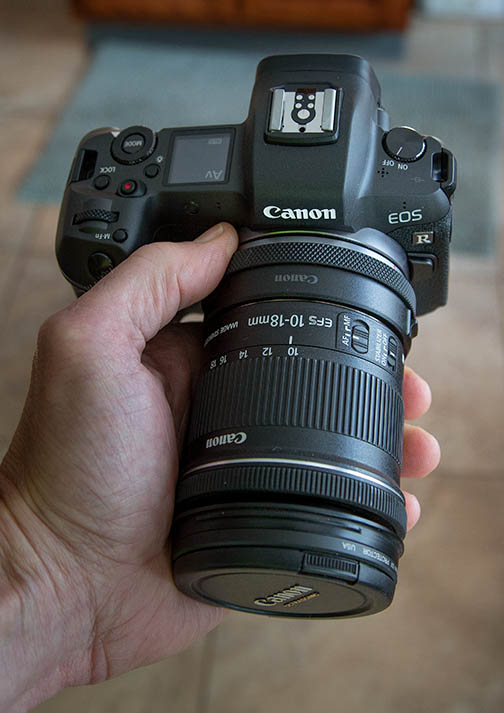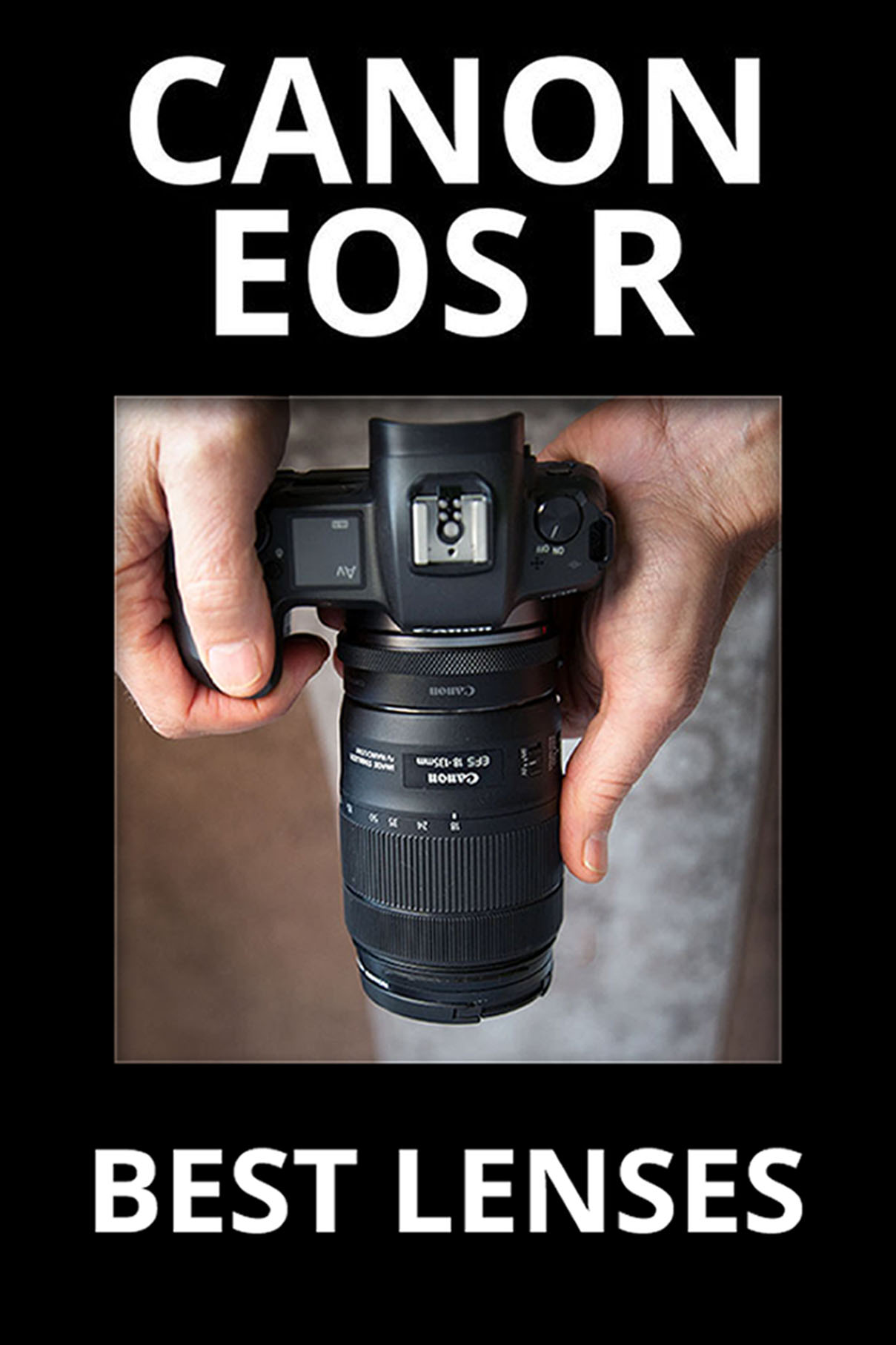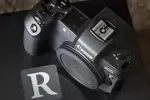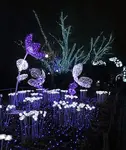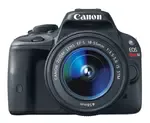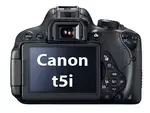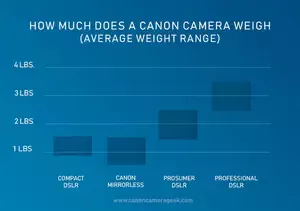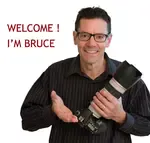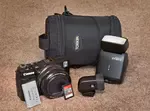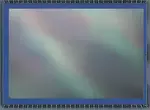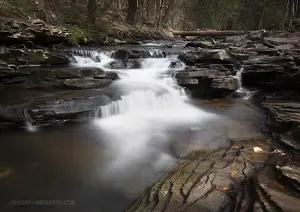Top 10 Canon R Lenses
Best Lenses For the Canon EOS R Mirrorless Camera
WRITTEN BY: BRUCE LOVELACE
UPDATED: March 21, 2024
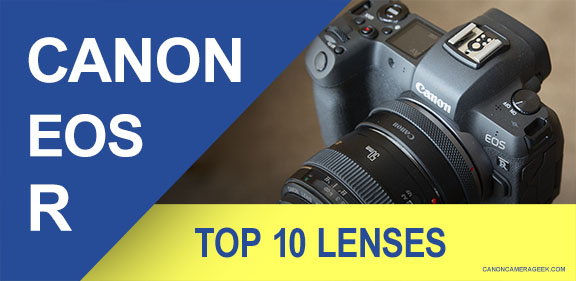
You either already have your Canon EOS R or you're eyeing it up and you want to know what are the best Canon R lenses for you to use. This post will give you my best recommendations for the top 10 lenses for your Canon EOS R camera.
Your specific needs are clearly different than mine, but hopefully reading this post will give you solid advice so that you can make the right choice and get what's best for you.
One important question to ask first is does the Canon EOS R camera need a lens adapter.
Canon's RF lenses fit natively on Canon R cameras without the need for an adapter. Canon's EF and EF-S lenses require the use of one of the EF-EOS R adapters. When a smaller EF-S lens is attached to your Canon R with one of the adapters, you get a cropped image. Only the middle 62.5% of the sensor is being used.
Understanding which lenses can go on which camera mounts can be confusing, That prompted me to write a helpful article that's a simple guide to Canon Lens compatibility. Here's that post.
1. Canon EF-S 18-135mm f/3.5-5.6
The Canon EF-S 18-135mm lens is the best lens to start with. It's a versatile, general purpose lens to go with your Canon R mirrorless camera. The 18-135 focal length gives you a wide range of focal lengths.
The 18-135 is a suitable lens to use on a large variety of subjects. It's much more affordable than the RF 24-105mm kit lens and it gives you great image quality.
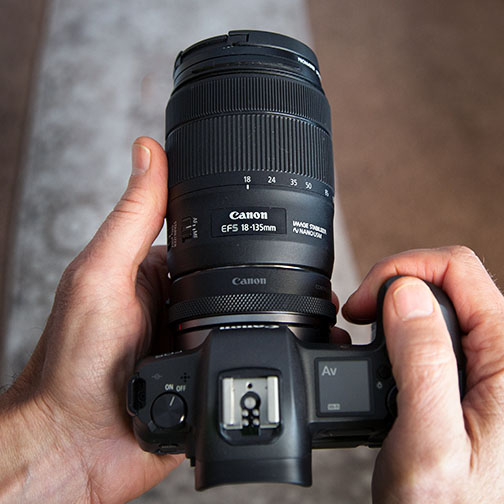 Canon 18-135mm lens, EOS R adapter, and EOS R camera
Canon 18-135mm lens, EOS R adapter, and EOS R cameramake a great starting combination that's affordable and versatile.
The 7.5x zoom on the 18-135 lens covers a nice wide angle telephoto setting. The 18-135 is one of the smaller EF-S lens, so with the 1.6x crop factor you get the equivalent angle of view of a 29mm up to a 216mm full frame lens.
The 18-135mm Nano is what I keep on my Canon EOS R camera most of the time. Here's my complete post on the 18-135 lens.
ALTERNATIVE LENS: The newer version that's made specifically to go on Canon's mirrorless line of cameras, like the EOS R, is the RF-S 18-150mm lens. It has a little more magnification 150mm instead of the original 135mm.
2. Canon EF-S 10-18mm F/3.5-5.6
The Canon EF-S 10-18mm lens is the perfect lens to match with the 18-135mm lens just discussed. The two of them together give you an extensive range of focal lengths (10-135mm) to handle any type of photography except maybe for shooting high level sports and wildlife photography.
Both of these first two recommended lenses are EF-S lenses. They will give you a cropped image when used on the full frame Canon R camera, but that's really no big deal because of their wide focal lengths.
The Canon 10-18 EF-S lens, when mounted to your Canon EOS R camera, is great for shooting landscapes and with the articulating Canon R articulating LCD screen, is the perfect lens for vlogging.
That's one of the huge advantages of using The EOS R adapter. You can use either EF or EF-S lenses. See my complete post on the Canon EF-S 10-18mm lens.
3. Canon EF 24-105mm f/4.0 Kit lens
The Canon EF 24-105mm lens has been the standard kit lens for serious photographers shooting Canon full frame DSLR cameras for many years. I've used my 24-105mm f/4.0 lens more than any other over the last decade by a large amount.
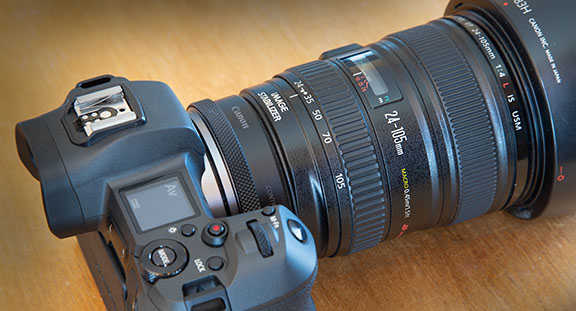 My go-to general purpose lens, the 24-105mm f/4 lens
My go-to general purpose lens, the 24-105mm f/4 lensmounted to the EF-EOS R adapter and Canon EOS R camera body
If you think the 24-105mm lens has the right zoom focal length range (5x) for your shooting style, you have 5 options. There are 3 different EF mount versions of this lens and two different RF mounts versions.
The original f/4.0 came out in 2005, a cheaper variable maximum aperture kit version came out in 2014, and the pro redesigned f/4.0 version came out in 2016. With the advent of mirrorless cameras, like your Canon EOS R, Canon released the RF 24-105mm f/4.0 in 2018 and the very affordable RF 24-105mm f/4.0-f/7.1 kit lens in 2022.
There are plenty of pre-owned 24-105mm lenses available which can save you a ton of money. Click the graphic below to check on current prices.
This post contains affiliate links and the publisher may be compensated if you make a purchase after clicking on my links, at no cost to you.
KEH: WHERE I BUY CANON GEAR
"I've found that the condition of the used equipment from KEH is excellent and a whole lot cheaper than buying new" - Bruce, the Canon Camera Geek
Since the EF lenses work so well on the Canon R, I have no need to purchase the RF mirrorless lenses. Here is my post on the EF 24-105mm lens and why I own two of them.
4. Canon EF 16-35mm F/4.0
The Canon EF 16-35mm f/4.0 is a good lens for you when you want the performance of a professional Canon "L" lens. Perfect for shooting landscapes, you can also use it for shooting inside in small spaces and outdoors for architectural and astrophotography.
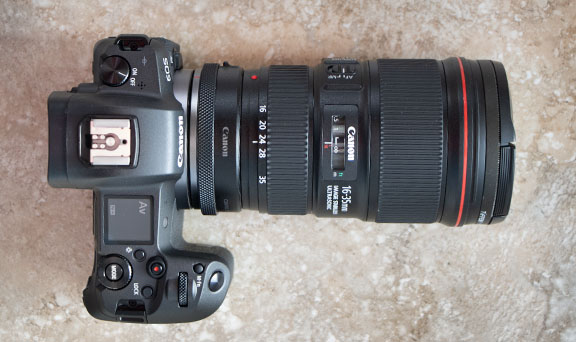 Canon EF 16-35mm f/4.0 lens
Canon EF 16-35mm f/4.0 lensattached to EOS R adapter and Canon R mirrorless body
The F/2.8 version of the 16-35mm is about twice the price of the f/4.0 version, but gives you a full one-stop advantage in letting more light in at maximum aperture.
Here's my complete post on the Canon 16-35mm f/4.0 lens.
5. Canon 70-200mm Lens
Although I have the f/2.8 version of the Canon EF 70-200mm lens, I recommend the f/4.0 version of the 70-00mm for you. It is so much more affordable, it's smaller, and gives you a better balance when matched with the somewhat compact Canon EOS R camera.
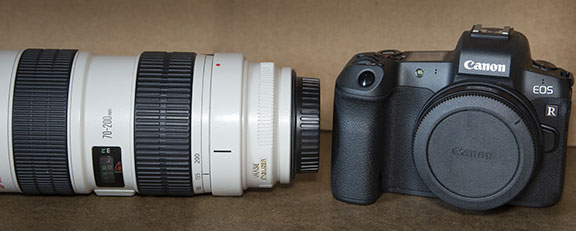 Canon EOS R camera + 70-200mm f/4.0 lens
Canon EOS R camera + 70-200mm f/4.0 lensOn the full frame Canon R you will still get great bokeh when shooting wide open at f/4.0. Here's my thoughts on the bokeh with the 70-200 f/4 versus the 70-200 f/2.8.
6. Canon 85mm f/1.8 Prime
The Canon 85mm f/1.8 lens is an outstanding lens for shooting portraits. it has a really wide (f/1.8) maximum aperture which gives you the ability to get very pleasing out-of-focus backgrounds behind your subject.
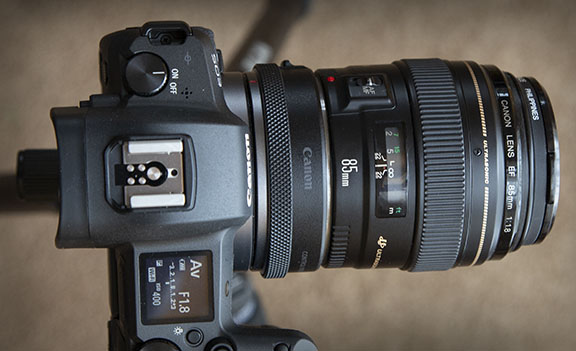 My 85mm prime lens.
My 85mm prime lens.Compact, light, sharp focusing, fast, and cheap to buy
Also, the 85mm focal length is a very good lens choice for shooting small family portraits. It was the very first portrait lens I relied on before I was able to afford the pricier 70-200mm f/2.8.
I pair my 85mm lens with a Canon extension tube to make it a great choice for shooting macro photos. Here's my complete post on the 85mm f/1.8 prime lens.
7. Canon EF 24-70 F/2.8 Lens
The Canon EF 24-70mm F/2.8 lens is a favorite of event photographers because of its fast maximum aperture of f/2.8 and its wide angle to short telephoto zoom range.
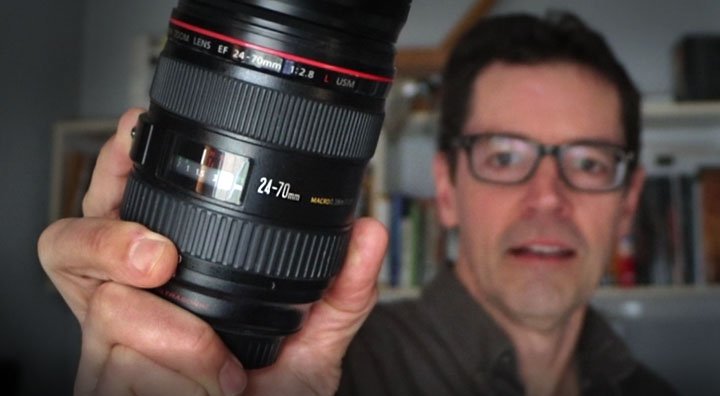 Me and my Canon EF 24-70mm f/2.8
Me and my Canon EF 24-70mm f/2.8Popular with event photographers
Wedding and event photographers want a lens that performs in dark reception halls and other dimly lit shooting situations. These lenses are no longer in production, but they're still available, new or used.
I prefer the extra reach on the telephoto end of my 24-105mm f/4.0 lenses, but I really appreciate the f/2.8 aperture of the 24-70mm f/2.8 particularly when shooting indoors in dimly lit environments.
8. Canon Nifty Fifty Lens
Any one of the Canon EF 50mm lenses is the perfect starter lens for Canon mirrorless shooters who want to keep it simple. Super affordable and super compact.
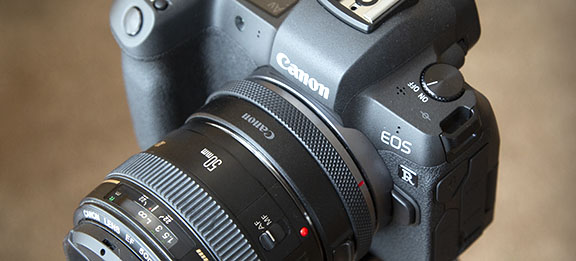 My Nifty Fifty mm lens mounted on the Canon EOS R.
My Nifty Fifty mm lens mounted on the Canon EOS R.using the Canon EF-EOS R lens adapter
Zoom lenses are more versatile, but keeping things simple and easy often gives you a more enjoyable shooting experience. The f/1.4 is fast enough to shoot night scenes and astrophotography if you don't need the wider angle to compose your photo.
The Canon EF 50mm F/1.4 lens is popular with the Canon R because of it's high image quality. I purchased my Canon EF f/1.4 from KEH. Here's my post comparing the different versions of the Canon EF 50mm lenses.
9. Canon EF 100-400mm F/4.5-f/5.6
This is the largest and most expensive Canon R lens on the list of top ten. It's the lens you want if you want to do serious wildlife, bird, sports, or action photos where you need the extra magnification.
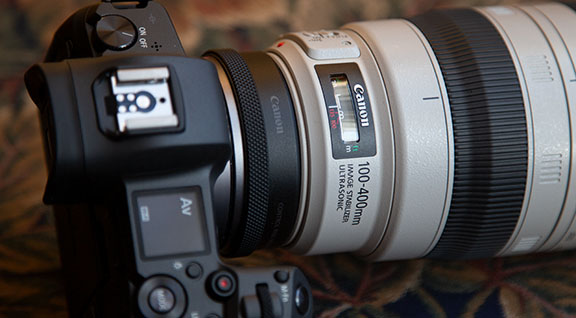 The Canon EF 100-400mm f/4.5-5.6 IS II Lens
The Canon EF 100-400mm f/4.5-5.6 IS II LensA good match with the Canon R for shooting wildlife and sports.
The Canon EOS R is a good (not great) camera for shooting fast moving subjects, so you don't want your lens choice to be a limiting factor. The Canon EF 100-400mm f/4.5-5.6 L IS II focuses fast and accurately.
I replaced my Canon 400mm f/5.6, which was incredibly sharp, with the 100-400 IS II and I'm glad I did because the 100-400mm lens is more versatile with its 4x zoom range.
10. Canon RF 100mm f/2.8 Macro
This is one of Canon's finest lens designs yet. Perfect for portraits and yes, outstanding for macro photography. The Canon RF100mm F2.8 L MACRO IS USM lens achieves an impressive 1.4X magnification.
This lens has an Optical Image Stabilizer with up to 5 Stops of Shake Correction. That allows you to shoot hand held photos with seriously slow shutter speeds with no need for a tripod. The Canon RF 100mm f/2.8 lens is one of the lenses that made my best RF Prime Lens list, but is a little short to be labeled as one of the best sports lenses.
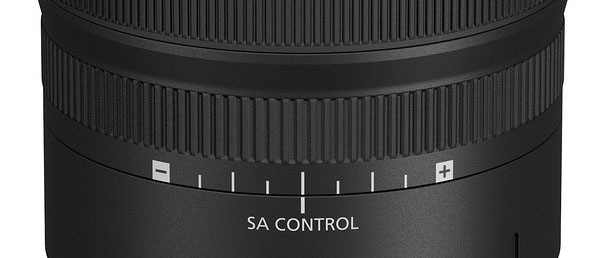 "Spherical Aberration" Control Ring
"Spherical Aberration" Control RingAdjust the bokeh for a dreamlike effect.
Mounted on your Canon R camera, the lens also has a spherical aberration control ring. You can adjust it to enhance that creamy, dreamlike soft-focus appearance to make your portraits even more beautiful.
Additionally, the RF lenses come with a control ring that YOU can set it to control whatever you wish, such as aperture setting, shutter speed, exposure compensation, or ISO.
DISCLAIMER: I don't own this lens.....YET! The enthusiastic photographer feedback and the technical lens tests all pointed to a yes, buy-it-soon decision. I bought it and love it. Here's my personal review of the RF 100mm macro lens.
Closing Thoughts on Canon R Lenses
You can save money when buying lenses for your Canon R by choosing from the collection of EF and EF-S lenses. You'll need to purchase one of the EF-EOS R lens adapters just once and it will work with any of those lenses. Here's the complete guide to the 3 versions of the EF-EOS R Adapter.
I often buy used Canon gear (in excellent, like-new condition) from KEH. Use this link if you want to explore prices on Canon EF, EF-S, or RF lenses.
I trust them fully and their 180-Day Warranty is comforting to have.
If you prefer buying nothing but new Canon lenses, please consider using the Amazon link below to explore prices and read reviews on lenses for your Canon R camera.

KEH: WHERE I BUY CANON GEAR
"I've found that the condition of the used equipment from KEH is excellent and a whole lot cheaper than buying new" - Bruce, the Canon Camera Geek
Stay inspired. Shoot a Canon!

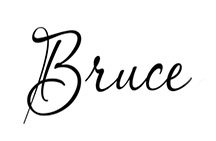
Bruce Lovelace is the publisher of Canon Camera Geek. Read more about him on the About Page. He also publishes how to articles and camera gear reviews at the Photography Tips website.
View some of Bruce's photos on Instagram and Flickr. Join the tribe of followers on YouTube. Bruce also runs photo workshops and provides 1 on 1 digital photography coaching.
Recent Articles
-
Canon Camera Guide. Useful Advice on Canon Cameras-Lenses-Accessories
Jan 01, 26 03:43 PM
Helpful advice on Canon Cameras, Canon lenses, and Canon camera accessories. Answers to your questions about Canon equipment. Canon camera equipment guide. -
10 Best Canon G1x Mark II Accessories - Essential Gear For G1X Mark 2
Dec 30, 25 03:59 PM
Make it fun! Upgrade your Canon Powershot Camera experience with the right Canon G1x Mark II Accessories, equipment add-ons. -
The 10 Canon RF 100mm Specs And Features That Matter.
Dec 30, 25 06:49 AM
Is the RF 100mm Macro worth the upgrade? 10 best features that matter the most. Helpful guide to the Canon RF 100mm specs and eatures you need to know about -
Canon RF 100mm Macro Sample Photos. Image Quality + Sharpness Test
Dec 29, 25 02:34 PM
Wondering if the RF 100mm is worth the upgrade? See high-resolution macro samples of insects, flowers, and portraits. Canon RF 100mm Macro Lens Sample Photos, -
Is the Canon G1X Mark II Sensor Still Good in 2026?-Specs & Real Value
Dec 22, 25 12:36 PM
Size matters. The big difference in this high-end point and shoot is the Canon G1X Mark II Sensor -
Canon 16-35mm f4 Sample Images. The Canon 16-35 Lens Sharpness Test
Dec 22, 25 10:51 AM
Canon 16-35mm f/4L IS Real-World Sample Images & Sharpness Review
